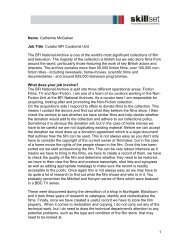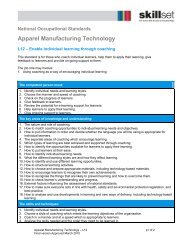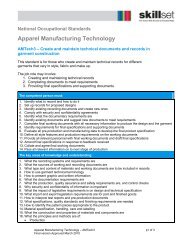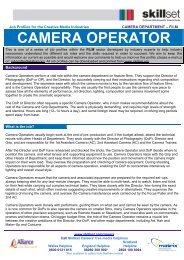Publishing in the Knowledge Economy - DTI Home Page
Publishing in the Knowledge Economy - DTI Home Page
Publishing in the Knowledge Economy - DTI Home Page
Create successful ePaper yourself
Turn your PDF publications into a flip-book with our unique Google optimized e-Paper software.
<strong>Publish<strong>in</strong>g</strong> <strong>in</strong> <strong>the</strong> knowledge economy<br />
The <strong>in</strong>dustry today<br />
<strong>the</strong> Internet. For a fuller discussion of<br />
subscriptions, see <strong>the</strong> customer focus section.<br />
In common with mass market newspapers,<br />
<strong>the</strong>re has been a retreat from <strong>the</strong> Web on <strong>the</strong><br />
part of consumer magaz<strong>in</strong>e publishers, with<br />
high-profile sites be<strong>in</strong>g closed or sold.<br />
One publisher of specialist titles told us:<br />
“The Internet should be an opportunity for some<br />
specialised titles, ma<strong>in</strong>ly for commerce and<br />
classifieds, e.g. travel and books, but it’s tak<strong>in</strong>g<br />
a long time to take off. It is quite hard to<br />
monetise it. For most <strong>in</strong>terests, <strong>the</strong>re is a natural<br />
onl<strong>in</strong>e community, but <strong>the</strong>re’s masses<br />
of stuff available on <strong>the</strong> Web from libraries,<br />
universities, etc. The danger is that your site<br />
just becomes a signpost. No-one is spend<strong>in</strong>g<br />
any money at any po<strong>in</strong>t, so how can you get<br />
a share of it?”<br />
By contrast, a publisher of magaz<strong>in</strong>es aimed<br />
at car buyers and male electronics purchasers<br />
told us that <strong>the</strong> Internet:<br />
“Is very significant for us. One of our sites is<br />
profitable on <strong>the</strong> basis of sell<strong>in</strong>g display<br />
advertis<strong>in</strong>g and sell<strong>in</strong>g content from it on to<br />
o<strong>the</strong>r sites. It also generates pr<strong>in</strong>t<br />
subscriptions.”<br />
A report by consultants McK<strong>in</strong>sey, published<br />
<strong>in</strong> <strong>the</strong> McK<strong>in</strong>sey Quarterly 1st Quarter 2001,<br />
summed up <strong>the</strong> dilemma fac<strong>in</strong>g many magaz<strong>in</strong>e<br />
publishers:<br />
“Many magaz<strong>in</strong>es fall between <strong>the</strong> available<br />
choices: <strong>the</strong>y spend a lot of money build<strong>in</strong>g a<br />
complete website and end up with one too<br />
costly to be a companion site but not compell<strong>in</strong>g<br />
enough to attract <strong>the</strong> high traffic and revenue of<br />
a dest<strong>in</strong>ation site. Resources are wasted, and<br />
readers are unhappy; people who are<br />
passionate about <strong>the</strong>ir magaz<strong>in</strong>es expect <strong>the</strong><br />
Web version to be as good as its pr<strong>in</strong>t<br />
counterpart, and if a site billed as a dest<strong>in</strong>ation<br />
experience fails to live up to those expectations,<br />
<strong>the</strong> chances of success fall and <strong>the</strong> magaz<strong>in</strong>e<br />
risks los<strong>in</strong>g valuable pr<strong>in</strong>t subscribers.”<br />
Some of <strong>the</strong> same arguments apply to<br />
so-called ‘mas<strong>the</strong>ad’ programm<strong>in</strong>g, that is,<br />
magaz<strong>in</strong>e-branded television programm<strong>in</strong>g,<br />
discussed below.<br />
Recently, mobile has emerged as an<br />
important platform/threat for teen magaz<strong>in</strong>es,<br />
with text messag<strong>in</strong>g absorb<strong>in</strong>g ever <strong>in</strong>creas<strong>in</strong>g<br />
amounts of time and money <strong>in</strong> <strong>the</strong> teen and<br />
even pre-teen age groups.<br />
10.5 Books<br />
As has already been mentioned, <strong>the</strong>re are a<br />
number of ways <strong>in</strong> which book publishers have<br />
embraced <strong>the</strong> Internet. For academic and STM<br />
publishers it has become fundamental. It is a<br />
major opportunity for <strong>the</strong>m to create arrays of<br />
new services that meet <strong>the</strong> demands of<br />
academic, research and library users. One<br />
lead<strong>in</strong>g academic publisher told us:<br />
“I am a big believer <strong>in</strong> server-side e-books<br />
(NetLibrary, ebrary, 24 by 7, etc). The ability to<br />
search across <strong>the</strong> field and cross-refer is what<br />
libraries want and what users want. But <strong>the</strong><br />
bus<strong>in</strong>ess model’s still unclear – many pioneers<br />
have gone bust.”<br />
Pr<strong>in</strong>t on demand is also a big opportunity,<br />
especially <strong>in</strong> this segment, as it allows<br />
publishers to keep books <strong>in</strong> pr<strong>in</strong>t that would<br />
o<strong>the</strong>rwise be uneconomic. However, <strong>the</strong> need<br />
to clear third party rights before us<strong>in</strong>g <strong>the</strong><br />
content <strong>in</strong> this manner was described to us as<br />
“a potential show-stopper”. Of course, as time<br />
goes on, publishers will be secur<strong>in</strong>g rights to<br />
use content <strong>in</strong> this way – or at least attempt<strong>in</strong>g<br />
to do so.<br />
64

















